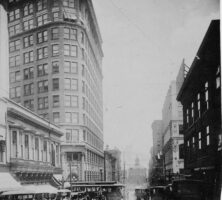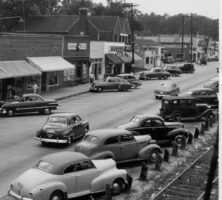Alfred Austell was a merchant, banker, financier, and railroad builder who organized the Atlanta National Bank, became one of the country’s largest cotton dealers, and built railroads in several southern states.
Alfred Arthur Austell was born in eastern Tennessee on January 14, 1814, the younger son of Jane Wilkins and William Austell, a planter. In 1836 he moved to Campbellton, Georgia, and went into business with his brother. In 1853 he married Francina Cameron of LaGrange, and the couple had four surviving children, Alfred Jr., Janie, Leila, and William.
Austell moved from Campbellton to Atlanta in 1858. With E. W. Holland he purchased the Bank of Fulton, where Austell also served as cashier. In 1861 Atlanta hosted the Bank Convention of the Confederate States, and Austell was a delegate.
At Austell’s instigation, the Atlanta National Bank was established in 1865, and operated out of his home for the first few months. Austell was not only director but also president from its founding until his death in 1881. In 1875 another new bank, the Atlanta Savings Bank, was incorporated, with Austell as its director.

Courtesy of Atlanta Journal-Constitution.
Austell was also associated with William H. Inman in the cotton business. Their company, Austell, Inman and Company, worked with S. W. Inman and Company in transporting cotton from Georgia to New York. Upon retiring in 1870, Austell turned his interests over to his son-in-law, James Swann.
Austell was a chief factor in building the Atlanta and Charlotte Air-Line and the Spartanburg-Asheville branch of what was later the Southern Railway. Because of his services in the advancing of transportation facilities in the South, the town of Austell in Cobb County was named for him.

Courtesy of Atlanta Journal-Constitution.
Although he opposed secession, he supported his state in its decision to do so. When the Civil War (1861-65) ended, Austell was a member of the committee that submitted resolutions congratulating the people of Atlanta on the end of the war, approving the appointment of the provisional governor, expressing a desire for the restoration of state government, and renewing old friendships and trade relations. The committee also included resolutions in favor of obeying the laws and patient industry, condemning the assassination of U.S. president Abraham Lincoln, declaring confidence in U.S. president Andrew Johnson, and commending the provisional governor, James Johnson.
Education was also of interest to Austell, and he served as a member of Atlanta’s first board of education. In 1878 he proposed a resolution to abolish the high school and superintendents’ office, arguing that doing so would help keep taxes and municipal costs low, but the resolution did not pass. He also served as a member of the First Presbyterian Church of Atlanta’s finance committee.
Austell died in Atlanta on December 7, 1881.








